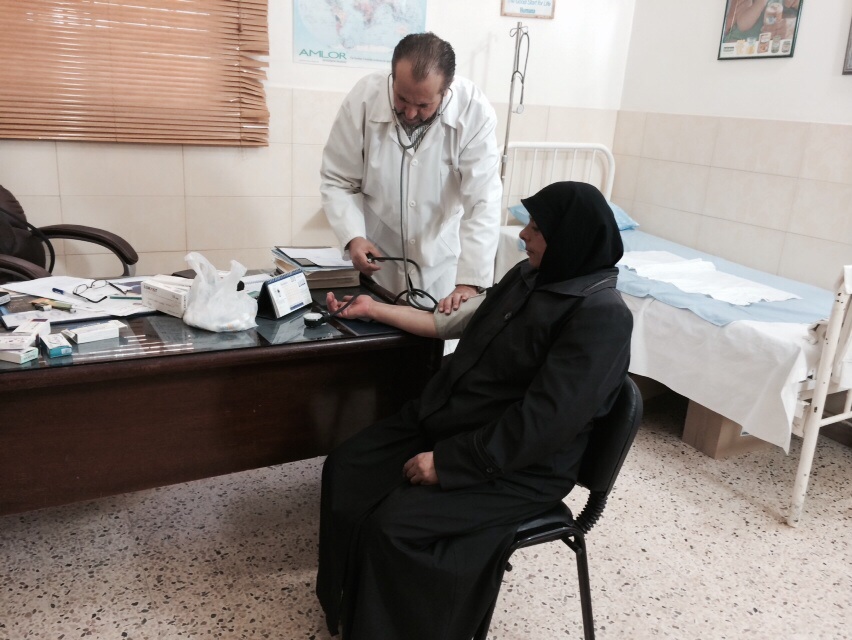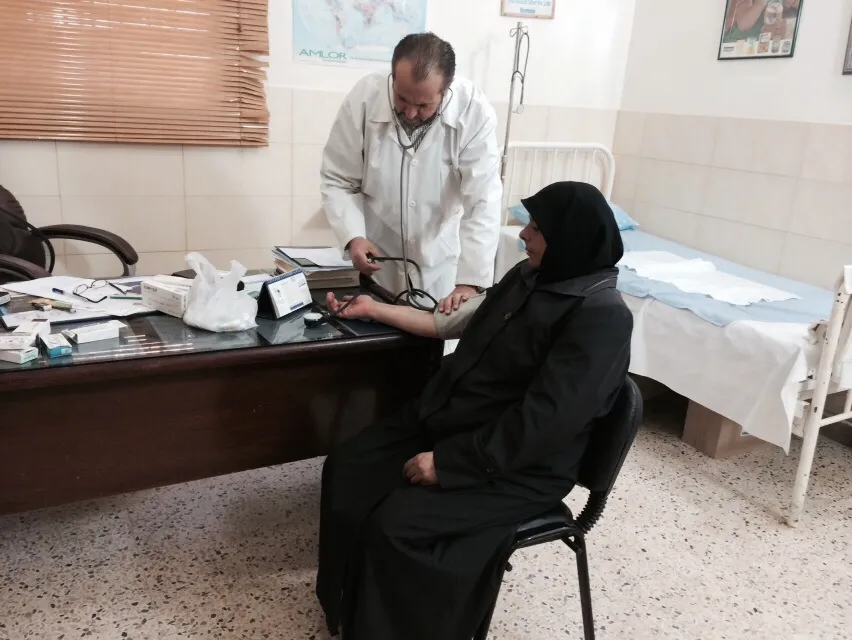An mHealth Approach to Non-Communicable Diseases for Refugees in Lebanon

In the R2HC-supported research study, “NCD guidelines and mHealth records for refugees in Lebanon”, we aim to improve the quality of care for patients with hypertension and/or type II diabetes at primary health care centers (PHCs) in Lebanon. We have taken on this initiative after seeing how the protracted Syrian crisis has forced many Syrians to flee to neighboring countries, including Lebanon, and resulted in additional challenges to the health systems in host countries. We know that non-communicable diseases (NCDs) are common in both the Syrian and Lebanese population and require regular follow-ups, and are often ignored during times of crisis. The study focuses on the delivery of health services for both refugees and local patients with NCDs, namely hypertension and type II diabetes. By working with the development of new guidelines and improvements to quality of care and patient compliance.
To implement the project, the Johns Hopkins Bloomberg School of Public Health partnered with the Massachusetts Institute for Technology (MIT) – Sana, and the International Organization for Migration (IOM). IOM is one of the international organizations supporting the humanitarian response for the Syrian crisis in Lebanon. IOM provides a wide range of services for refugees and Lebanese host communities, including primary health care consultations and access to essential medications at contracted PHCs.
We selected ten PHCs in Lebanon as study sites distributed throughout several areas: Beirut, Mount Lebanon, the South, and Bekaa valley. Five of the PHCs are under the support of IOM. International Medical Corps (IMC), supports the remaining five. Similar to IOM, IMC renders health services for refugees at its supported PHCs.In the R2HC-supported research study, “NCD guidelines and mHealth records for refugees in Lebanon”, we aim to improve the quality of care for patients with hypertension and/or type II diabetes at primary health care centers (PHCs) in Lebanon. We have taken on this initiative after seeing how the protracted Syrian crisis has forced many Syrians to flee to neighboring countries, including Lebanon, and resulted in additional challenges to the health systems in host countries. We know that non-communicable diseases (NCDs) are common in both the Syrian and Lebanese population and require regular follow-ups, and are often ignored during times of crisis. The study focuses on the delivery of health services for both refugees and local patients with NCDs, namely hypertension and type II diabetes. By working with the development of new guidelines and improvements to quality of care and patient compliance.
To implement the project, the Johns Hopkins Bloomberg School of Public Health partnered with the Massachusetts Institute for Technology (MIT) – Sana, and the International Organization for Migration (IOM). IOM is one of the international organizations supporting the humanitarian response for the Syrian crisis in Lebanon. IOM provides a wide range of services for refugees and Lebanese host communities, including primary health care consultations and access to essential medications at contracted PHCs.
We selected ten PHCs in Lebanon as study sites distributed throughout several areas: Beirut, Mount Lebanon, the South, and Bekaa valley. Five of the PHCs are under the support of IOM. International Medical Corps (IMC), supports the remaining five. Similar to IOM, IMC renders health services for refugees at its supported PHCs.

To collect data, we conduct phone interviews with patients and review medical files at the health centers. We have faced some challenges when conducting phone interviews: some patients wish not to participate, and some have difficulties comprehending the purpose of the study. As participation in the study is voluntary and based on informed consent, we respect the decision of patients not to participate and assure them that this does not affect the services they receive at the PHCs. For patients having difficulties understanding the purpose of the study, we take time to explain the scope of the research and the inputs expected from them, so that they can make an informed decision about their participation.
During the first part of the project, we assessed the current treatment guidelines on hypertension and type II diabetes used at the PHCs in Lebanon. Then, we focused on the development and adaptation of the new guidelines. In coordination with local and international health specialists, we finalized new guidelines on hypertension and type II diabetes that are aligned with the guidelines of the Ministry of Public Health of Lebanon. After, we held training sessions on the new guidelines for physicians and nurses working in the participating centers. The intent is to have guidelines that can be used or adapted by IOM and other agencies in contexts with displaced populations and during future emergencies.
Currently we are in phase two of the project, during which health professionals have the opportunity to treat patients according to the new guidelines. All participating centers have now received training on the guidelines.
The mHealth tool will be finalized by January 2016, marking phase three of the project. The mHealth tool is a tablet-based open source software application developed by Massachusetts Institute for Technology (MIT) – Sana. The tool aims to enable patients to keep track of their medical files, and will also allow physicians have access to treatment guidelines and previous consultation records. By using the mHealth application, physicians will be able to provide patients with their disease history and the medications prescribed at every visit by sending an SMS to the patient’s cellular phone. The application will also track the date of the next follow up visit, and send a reminder to the patient’s cellular phone. The application seeks to improve the patient’s ability to monitor their condition, and provide easy access to medical information in case the patient moves or unexpectedly seeks care from another provider, which occurs in contexts with refugees.
Stay updated
Sign up for our newsletter to receive regular updates on resources, news, and insights like this. Don’t miss out on important information that can help you stay informed and engaged.
Related articles


.png)
Explore Elrha
Learn more about our mission, the organisations we support, and the resources we provide to drive research and innovation in humanitarian response.